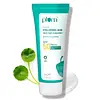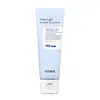What's inside
What's inside
 Key Ingredients
Key Ingredients

 Benefits
Benefits

 Concerns
Concerns

 Ingredients Side-by-side
Ingredients Side-by-side

Water
Skin ConditioningC12-15 Alkyl Benzoate
AntimicrobialDiethylamino Hydroxybenzoyl Hexyl Benzoate
UV FilterEthylhexyl Triazone
UV AbsorberBis-Ethylhexyloxyphenol Methoxyphenyl Triazine
Skin ConditioningCarbomer
Emulsion StabilisingButylene Glycol
HumectantBetaine
HumectantCaprylic/Capric Triglyceride
MaskingHelianthus Annuus Seed Oil
EmollientPropanediol
SolventCetearyl Olivate
Sorbitan Olivate
EmulsifyingGlycerin
HumectantCetearyl Alcohol
EmollientGlyceryl Stearate
EmollientTitanium Dioxide
Cosmetic ColorantZinc Oxide
Cosmetic ColorantTriethoxycaprylylsilane
Centella Asiatica Extract
CleansingHydrolyzed Sodium Hyaluronate
Skin ConditioningSodium Hyaluronate Crosspolymer
HumectantSodium Acetylated Hyaluronate
HumectantSodium Hyaluronate
HumectantArgania Spinosa Kernel Oil
EmollientAllantoin
Skin ConditioningPhenoxyethanol
PreservativeEthylhexylglycerin
Skin ConditioningPentylene Glycol
Skin ConditioningSodium Gluconate
Skin ConditioningCocos Nucifera Oil
MaskingLecithin
EmollientXanthan Gum
EmulsifyingTocopheryl Acetate
AntioxidantCitric Acid
BufferingWater, C12-15 Alkyl Benzoate, Diethylamino Hydroxybenzoyl Hexyl Benzoate, Ethylhexyl Triazone, Bis-Ethylhexyloxyphenol Methoxyphenyl Triazine, Carbomer, Butylene Glycol, Betaine, Caprylic/Capric Triglyceride, Helianthus Annuus Seed Oil, Propanediol, Cetearyl Olivate, Sorbitan Olivate, Glycerin, Cetearyl Alcohol, Glyceryl Stearate, Titanium Dioxide, Zinc Oxide, Triethoxycaprylylsilane, Centella Asiatica Extract, Hydrolyzed Sodium Hyaluronate, Sodium Hyaluronate Crosspolymer, Sodium Acetylated Hyaluronate, Sodium Hyaluronate, Argania Spinosa Kernel Oil, Allantoin, Phenoxyethanol, Ethylhexylglycerin, Pentylene Glycol, Sodium Gluconate, Cocos Nucifera Oil, Lecithin, Xanthan Gum, Tocopheryl Acetate, Citric Acid
Aloe Barbadensis Leaf Water
MaskingDiethylhexyl Succinate
EmollientPropanediol
SolventWater
Skin ConditioningDrometrizole Trisiloxane
UV AbsorberEthylhexyl Triazone
UV AbsorberNiacinamide
SmoothingDiethylamino Hydroxybenzoyl Hexyl Benzoate
UV FilterTerephthalylidene Dicamphor Sulfonic Acid
UV Absorber1,2-Hexanediol
Skin ConditioningBehenyl Alcohol
EmollientMethyl Trimethicone
Skin ConditioningSodium Polyacryloyldimethyl Taurate
Emulsion StabilisingHamamelis Virginiana Leaf Water
AstringentTromethamine
BufferingPolyacrylate Crosspolymer-6
Emulsion StabilisingArachidyl Alcohol
EmollientCaprylyl Glycol
EmollientEthylhexylglycerin
Skin ConditioningArachidyl Glucoside
EmulsifyingSodium Metaphosphate
BufferingAdenosine
Skin ConditioningTocopherol
AntioxidantSodium Hyaluronate
HumectantAllantoin
Skin ConditioningCitric Acid
BufferingSodium Benzoate
MaskingPotassium Sorbate
PreservativeAloe Barbadensis Leaf Water, Diethylhexyl Succinate, Propanediol, Water, Drometrizole Trisiloxane, Ethylhexyl Triazone, Niacinamide, Diethylamino Hydroxybenzoyl Hexyl Benzoate, Terephthalylidene Dicamphor Sulfonic Acid, 1,2-Hexanediol, Behenyl Alcohol, Methyl Trimethicone, Sodium Polyacryloyldimethyl Taurate, Hamamelis Virginiana Leaf Water, Tromethamine, Polyacrylate Crosspolymer-6, Arachidyl Alcohol, Caprylyl Glycol, Ethylhexylglycerin, Arachidyl Glucoside, Sodium Metaphosphate, Adenosine, Tocopherol, Sodium Hyaluronate, Allantoin, Citric Acid, Sodium Benzoate, Potassium Sorbate
 Reviews
Reviews

Ingredients Explained
These ingredients are found in both products.
Ingredients higher up in an ingredient list are typically present in a larger amount.
Allantoin is a soothing ingredient known for its protective and moisturizingg properties. Because of this, it is often added to products with strong active ingredients.
Studies show higher concentrations of this ingredient can promote wound healing.
Though it can be derived from the comfrey plant, allantoin is produced synthetically for cosmetic products to ensure purity.
Learn more about AllantoinCitric Acid is an alpha hydroxy acid (AHA) naturally found in citrus fruits like oranges, lemons, and limes.
Like other AHAs, citric acid can exfoliate skin by breaking down the bonds that hold dead skin cells together. This helps reveal smoother and brighter skin underneath.
However, this exfoliating effect only happens at high concentrations (20%) which can be hard to find in cosmetic products.
Due to this, citric acid is usually included in small amounts as a pH adjuster. This helps keep products slightly more acidic and compatible with skin's natural pH.
In skincare formulas, citric acid can:
While it can provide some skin benefits, research shows lactic acid and glycolic acid are generally more effective and less irritating exfoliants.
Most citric acid used in skincare today is made by fermenting sugars (usually from molasses). This synthetic version is identical to the natural citrus form but easier to stabilize and use in formulations.
Read more about some other popular AHA's here:
Learn more about Citric AcidDiethylamino Hydroxybenzoyl Hexyl Benzoate (DHHB) is a chemical UV-A absorber. It is formulated for high UVA protection (320-400 nm).
DHHB is well-liked for:
DHHB has been approved by the EU, Japan, Taiwan, and South America for use up to 10%. Unfortunately, it has not been approved for use in the US or Canada due to slow regulatory processes.
This ingredient is soluble in oils, fats, and lipids.
Learn more about Diethylamino Hydroxybenzoyl Hexyl BenzoateEthylhexyl Triazone is a modern chemical sunscreen that protects from UV-B radiation.
It is the most effective of existing UV-B filters, as it provides the highest level of photo-stable absorption. It protects from the entire UV-B range (280 to 320nm), with it's highest level of protection at 314nm.
Ethylhexyl Triazone is oil soluble, oderless and colorless, which mean it is able to be incorporated into a variety of different formulations.
It is not currently available within the United States due to slow changing FDA regulations. Outside of the US, it is used in formulations at concentrations up to 5%.
Learn more about Ethylhexyl TriazoneEthylhexylglycerin (we can't pronounce this either) is commonly used as a preservative and skin softener. It is derived from glyceryl.
You might see Ethylhexylglycerin often paired with other preservatives such as phenoxyethanol. Ethylhexylglycerin has been found to increase the effectiveness of these other preservatives.
Propanediol is an all-star ingredient. It softens, hydrates, and smooths the skin.
It’s often used to:
Propanediol is not likely to cause sensitivity and considered safe to use. It is derived from corn or petroleum with a clear color and no scent.
Learn more about PropanediolSodium Hyaluronate is hyaluronic acid's salt form. It is commonly derived from the sodium salt of hyaluronic acid.
Like hyaluronic acid, it is great at holding water and acts as a humectant. This makes it a great skin hydrating ingredient.
Sodium Hyaluronate is naturally occurring in our bodies and is mostly found in eye fluid and joints.
These are some other common types of Hyaluronic Acid:
Learn more about Sodium HyaluronateWater. It's the most common cosmetic ingredient of all. You'll usually see it at the top of ingredient lists, meaning that it makes up the largest part of the product.
So why is it so popular? Water most often acts as a solvent - this means that it helps dissolve other ingredients into the formulation.
You'll also recognize water as that liquid we all need to stay alive. If you see this, drink a glass of water. Stay hydrated!
Learn more about Water